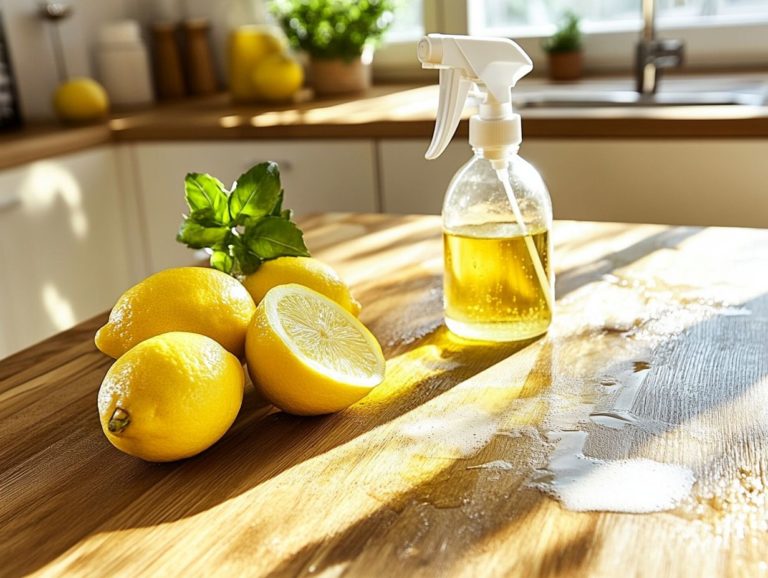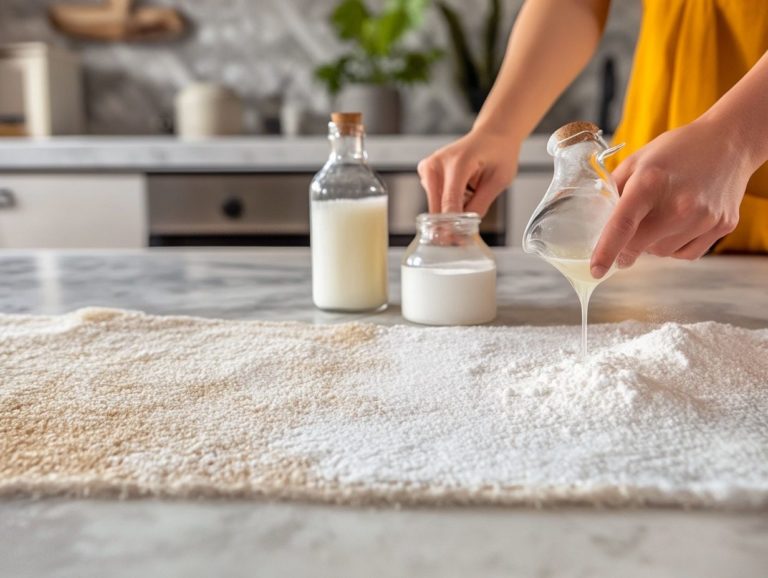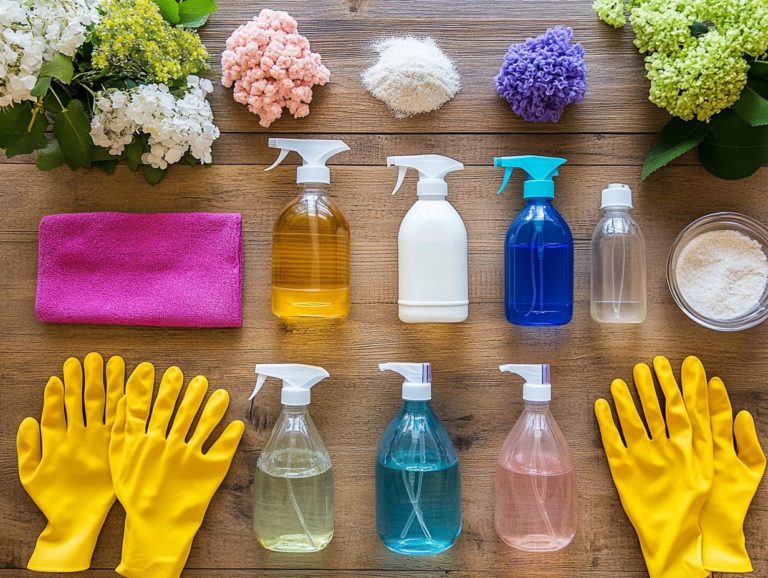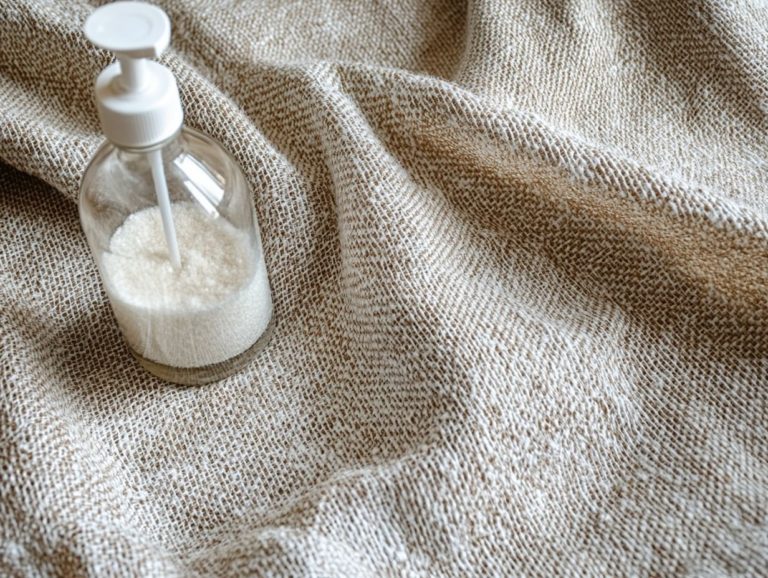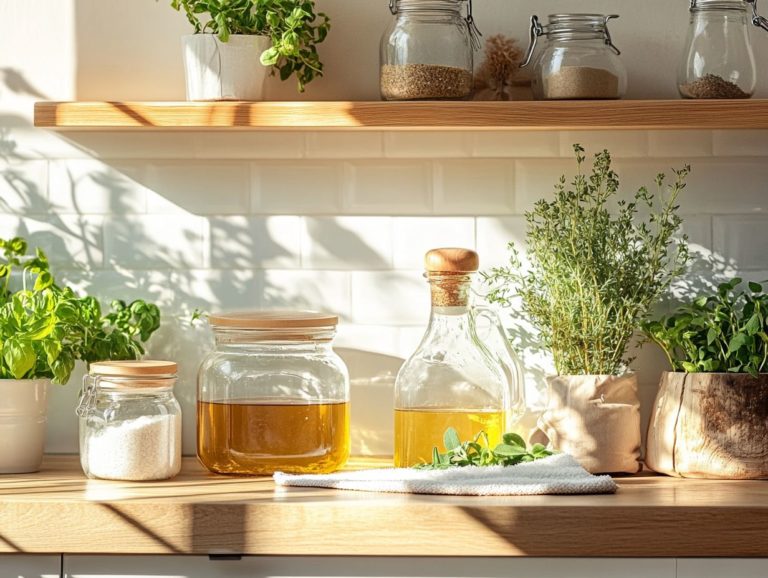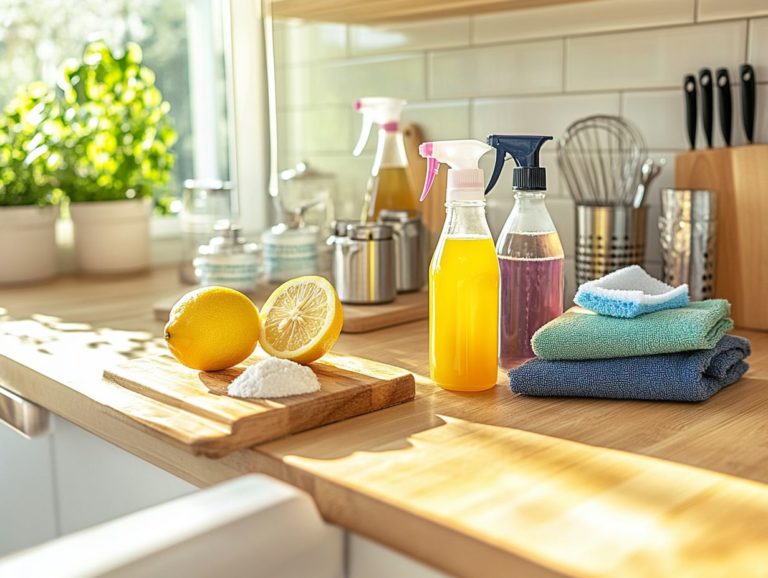Creating an Eco-Friendly Cleaning Routine
Are you ready to make a change that benefits both you and the Earth? Let s dive into eco-friendly cleaning!
In today s world, where awareness of our environmental footprint is at an all-time high, embracing an eco-friendly cleaning routine isn t just wise; it s an investment in both your health and the planet s future. Adopting natural alternatives and considering third-party certifications like the EcoCert label and Safer Choice symbol can ensure you re making the best choices.
This article delves into the many benefits of using green cleaning products, showing you how these choices can enhance your well-being while also being kind to your wallet by reducing household waste.
It highlights specific harmful ingredients to steer clear of and provides strategies for crafting your own cleaning solutions. You ll also find practical guidance for maintaining a sustainable cleaning practice, including the use of reusable cloths and biodegradable materials.
You ll uncover how even the simplest changes can lead to a profound impact!
Contents
- Key Takeaways:
- Why Should You Create an Eco-Friendly Cleaning Routine?
- What Are the Benefits of Using Eco-Friendly Cleaning Products?
- What Are the Ingredients to Avoid in Cleaning Products?
- How to Create an Eco-Friendly Cleaning Routine?
- What Are Some Eco-Friendly Cleaning Tips?
- Frequently Asked Questions
- Why is it important to create an eco-friendly cleaning routine?
- What are some eco-friendly alternatives to traditional cleaning products?
- How can I reduce waste in my cleaning routine?
- Can I still effectively clean my home with eco-friendly products?
- What are some other benefits of using eco-friendly cleaning products?
- How can I make my own eco-friendly cleaning products at home?
Key Takeaways:
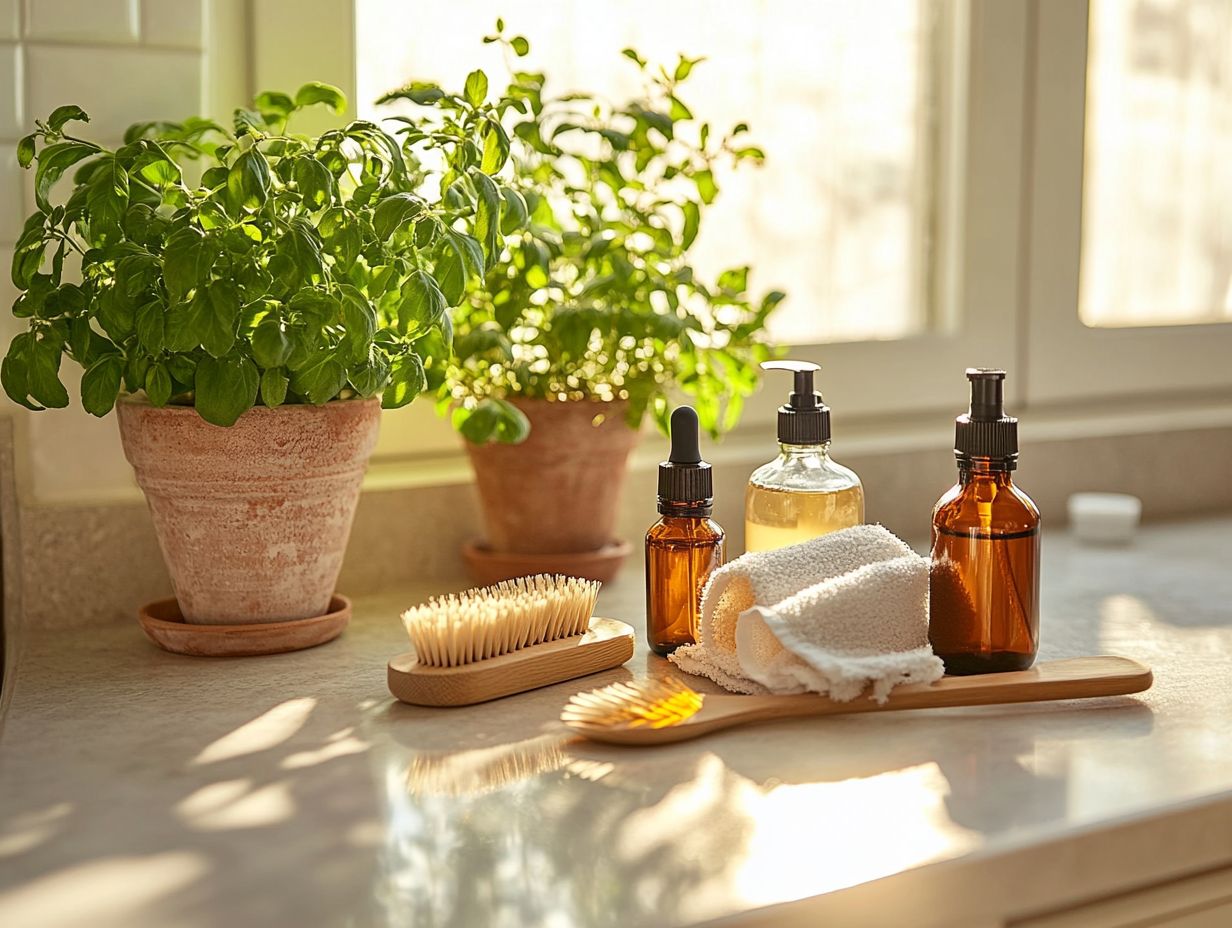
- Switching to eco-friendly cleaning products can benefit your health, the environment, and your wallet, while effectively reducing plastic waste.
- Ingredients to avoid in traditional cleaning products include phthalates, ammonia, chlorine, and triclosan.
- Creating an eco-friendly cleaning routine can be done by making your own products, looking for eco-friendly labels, and using natural alternatives.
Why Should You Create an Eco-Friendly Cleaning Routine?
Establishing an eco-friendly cleaning routine is crucial for creating a healthy and safe home. Conventional cleaners frequently harbor harmful chemicals such as benzene, leading to indoor air pollution and a range of health risks, including respiratory issues and skin irritations.
By choosing eco-friendly cleaning products, you can dramatically minimize your exposure to volatile organic compounds (VOCs) and other toxic substances that compromise your indoor air quality. This choice also allows you to make a positive impact on the environment and champion sustainable cleaning practices, thereby reducing packaging waste.
This guide shows why eco-friendly cleaning products matter and how they can transform your cleaning routine.
What Are the Benefits of Using Eco-Friendly Cleaning Products?
Utilizing eco-friendly cleaning products presents a wealth of advantages that extend far beyond simply achieving a spotless home. These choices foster healthier indoor environments, mitigate health risks, and lessen your overall environmental footprint by promoting ingredient safety.
Formulated with biodegradable materials and natural ingredients, sustainable cleaning solutions effectively reduce indoor air pollution and eliminate harmful chemicals often found in conventional cleaners. By opting for eco-friendly alternatives, you not only prioritize the safety of your home s ingredients but also support the green household cleaning market through reputable brands like Seventh Generation and Blueland, including certified products with the EcoCert label.
Switching now can lead to immediate benefits for your health and the planet!
1. Safer for Your Health
Eco-friendly cleaning products are much safer for your health than conventional cleaners. They are crafted without harmful chemicals that can pose various health risks, including allergies, asthma, and other respiratory issues. Many traditional cleaning products contain harmful chemicals released into the air, called volatile organic compounds (VOCs), and phthalates, which contribute to indoor air pollution and increase chemical exposure in your home. In contrast, eco-friendly alternatives prioritize safety by utilizing natural ingredients that are less likely to lead to health complications.
Experts like Celia Ristow and Samara Geller from the Environmental Working Group advocate for using green cleaning products. Common components in conventional cleaners, such as bleach, ammonia, and artificial fragrances, can aggravate respiratory conditions and trigger allergic reactions. Samara Geller emphasizes the effectiveness of eco-friendly products in cleaning without jeopardizing your health.
These greener alternatives minimize the risk of chemical exposure and foster a healthier indoor environment, which is especially crucial for vulnerable groups like children and those with pre-existing health conditions. By choosing eco-friendly options, you can maintain a pristine home while actively contributing to a safer planet. The American Cleaning Institute supports this healthier choice.
2. Better for the Environment
Eco-friendly cleaning products reduce the environmental impact of cleaning. By opting for biodegradable materials and sustainable packaging, you significantly cut down on plastic waste and prevent harmful chemicals from leaching into ecosystems. This intentional choice helps preserve natural resources and advocates for a greener future, making it an essential part of your responsible cleaning routine.
Conventional cleaners contribute significantly to environmental degradation. The U.S. Environmental Protection Agency estimates that over 300 million tons of plastic waste end up in landfills each year, much of it from single-use packaging. The harmful chemicals in these products can pollute water sources, adversely impacting aquatic life and biodiversity. In contrast, eco-friendly alternatives leverage renewable resources, leading to less pollution.
Studies reveal that households using green products can reduce their carbon footprint by up to 30%. By embracing these alternatives, you not only create a healthier indoor environment but also contribute to vital conservation efforts around the globe. This effort is endorsed by Better Homes & Gardens and Iowa State University.
3. Saves Money
Along with their health and environmental advantages, eco-friendly cleaning products can save you money over time. By using concentrated eco-friendly cleaners and reusable cloths, you can significantly cut down on household waste and lower your overall cleaning expenses. This is especially true in today s green market.
Many eco-friendly products serve multiple purposes, allowing you to forgo the need for several conventional cleaners for different tasks. This not only optimizes your cleaning routine but also protects your budget. The use of DIY options like vinegar, baking soda, and essential oils enriches your eco-friendly cleaning routine.
This approach streamlines your cleaning process and helps you avoid the clutter of unnecessary products. To enhance your savings, consider making your own cleaning solutions with simple ingredients like vinegar, baking soda, and essential oils. These DIY options are budget-friendly and incredibly effective, ensuring that your space remains spotless without breaking the bank.
Investing in quality, reusable cleaning tools such as washable mop pads and microfiber cloths can dramatically reduce single-use waste. Ultimately, this contributes to a more sustainable and economical household, making you feel great about your cleaning choices.
Start your eco-friendly journey today!
What Are the Ingredients to Avoid in Cleaning Products?
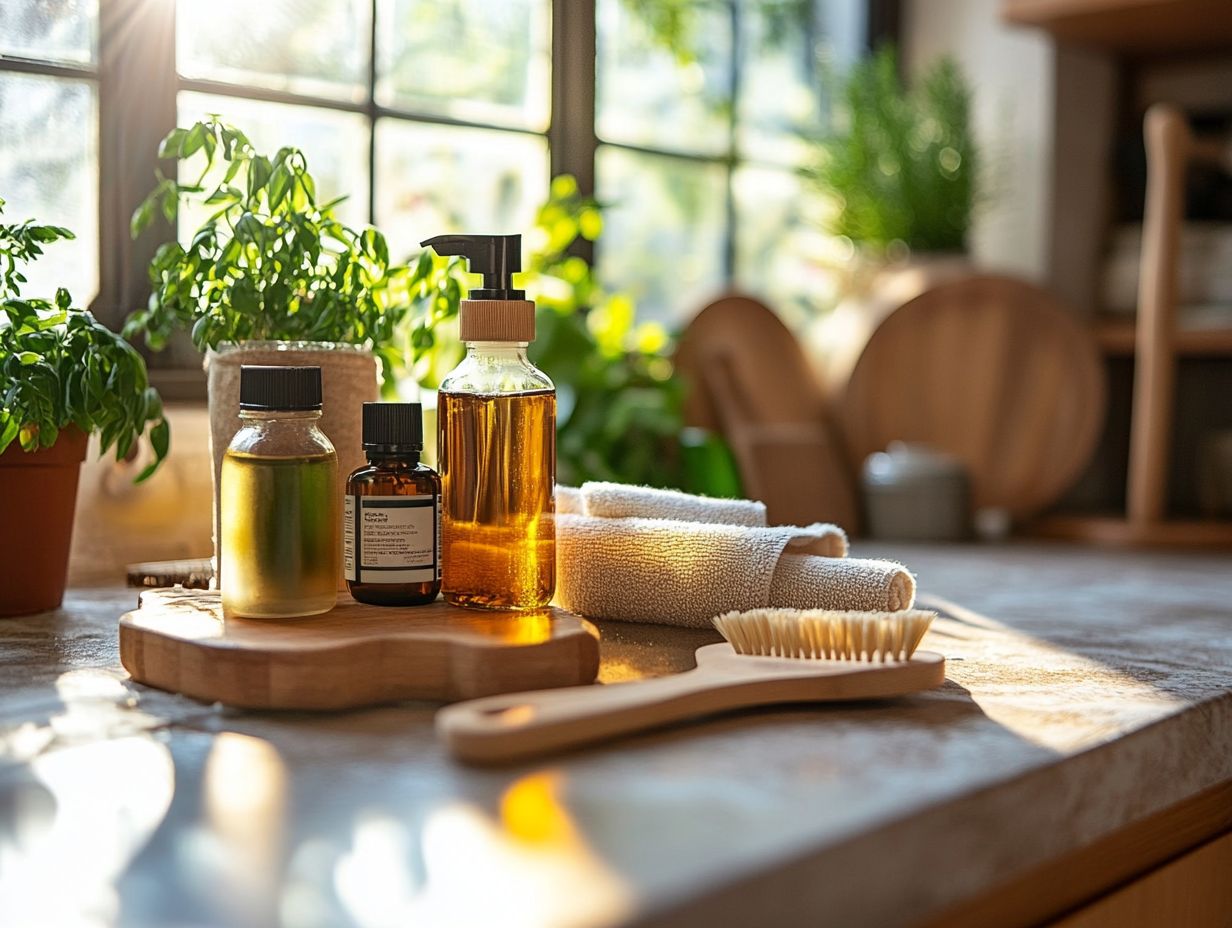
When selecting cleaning products, it s crucial to be vigilant about the harmful ingredients to avoid to ensure both your well-being and the health of the environment. Look for third-party certifications like the EcoCert label and Safer Choice symbol to guide you to safer and more eco-friendly choices.
Familiarize yourself with common harmful chemicals often lurking in conventional cleaners, such as phthalates, ammonia, chlorine, and triclosan. These substances can pose serious health risks and contribute to indoor air pollution. Understanding ingredient safety is essential for making informed choices.
By understanding the effects of these ingredients, you empower yourself to make informed choices, leading to safer, eco-friendly cleaning solutions that benefit you and the planet.
1. Phthalates
Phthalates are harmful chemicals often found in conventional cleaning products that can disrupt your hormonal balance, potentially leading to reproductive health issues. These compounds can evaporate into the air, worsening indoor air pollution and posing risks to everyone in the household, especially children. It’s crucial to avoid cleaning products that list phthalates among their ingredients.
Their widespread presence in everyday items ranging from air fresheners to surface cleaners raises significant concerns about your overall health and safety. The buildup of phthalates in the environment also harms wildlife, highlighting that this issue extends well beyond individual well-being.
Fortunately, many brands are stepping up, crafting cleaning solutions that are phthalate-free and prioritizing natural ingredients. If you’re in search of safer options, look for products made with essential oils, vinegar, or biodegradable soaps. These alternatives can provide effective cleaning power without the risks associated with harmful chemicals.
By prioritizing ingredient safety, you not only foster a healthier home environment but also champion eco-friendly practices. Organizations like the American Cleaning Institute and certifications like the EcoCert label are leading the way in promoting these safer alternatives.
2. Ammonia
Ammonia is a harmful chemical to avoid when choosing cleaning products. It can irritate your skin, eyes, and respiratory system, posing significant health risks for your household. Using ammonia in poorly ventilated spaces can contribute to indoor air pollution, worsening conditions like asthma and allergies. Opt for ammonia-free alternatives to foster a healthy home environment.
This is especially important for families with young children or pets, who are more vulnerable to the toxins released by these harsh cleaners. Prolonged exposure to ammonia and harmful chemicals that can evaporate into the air can lead to chronic respiratory problems and may trigger severe allergic reactions over time.
Fortunately, numerous eco-friendly cleaning options are available that rely on natural ingredients such as vinegar, baking soda, and essential oils, which do not contribute to indoor air pollution or plastic waste. These alternatives not only handle dirt and grime effectively but also enhance indoor air quality while remaining safe for everyone, including your furry friends.
By making informed choices, you can cultivate a cleaner, healthier living space without sacrificing effectiveness while reducing household waste and environmental impact.
Check the labels of your cleaning products today to ensure they are safe for you and the environment!
3. Chlorine
Chlorine is a potent disinfectant often found in traditional cleaning products. However, it comes with health risks such as respiratory issues and skin irritation.
Chlorine can react with other common cleaning agents to produce toxic fumes. This puts everyone in your household at risk. To establish a safer cleaning routine, it s wise to choose chlorine-free products that uphold cleaning standards without jeopardizing your well-being, such as those with third-party certifications like the Safer Choice symbol or EcoCert label.
These risks underscore the necessity of being conscious about the cleaning agents you use at home. Not only do chlorine-based products contribute to poor indoor air quality, but they can also lead to long-lasting health issues, particularly for vulnerable groups like children and those with pre-existing conditions.
The good news is that effective eco-friendly alternatives are available, offering similar disinfecting power without the dangers tied to chlorine. Products from brands like Seventh Generation and Mrs. Meyer’s Clean Day are great options. Alternatives such as vinegar, hydrogen peroxide, and essential oils provide safe ways to sanitize surfaces while creating a fresher, healthier environment.
Don t wait! Switch to safer cleaning products today and prioritize both cleanliness and safety in your daily life.
4. Triclosan
Triclosan is a rather controversial chemical often lurking in antibacterial cleaning products, and its presence raises serious questions about ingredient safety, possible health problems, and its role in antibiotic resistance. Studies have indicated that triclosan might play a role in antibiotic resistance and hormonal disruptions, which is why many consumers like you are on the hunt for triclosan-free cleaning solutions and natural alternatives. Choosing eco-friendly products that steer clear of triclosan is not just a personal preference; it s essential for fostering a healthier home environment and safeguarding public health.
More people are becoming aware of the harmful effects of this chemical. Manufacturers are increasingly motivated to reformulate their products. This trend shows that consumers want safer and more eco-friendly cleaning products.
By choosing effective alternatives like essential oils and biodegradable surfactants, you can keep your home clean and help the planet, paving the way for a future where safety and ecological responsibility coexist harmoniously.
How to Create an Eco-Friendly Cleaning Routine?
Creating a cleaner home is not just smart; it s fun! Crafting an eco-friendly cleaning routine requires a careful selection of cleaning products and methods that emphasize health and sustainability, reduce indoor air pollution, and plastic waste. By integrating eco-friendly products, natural alternatives, and even DIY cleaning solutions into your regimen, you can substantially lessen your environmental footprint while ensuring your home remains clean and safe, free from harmful chemicals and volatile organic compounds.
This guide is packed with simple steps to help you create a cleaning routine that is effective and eco-friendly. Let s get started on making your home safer for you and the planet!
1. Make Your Own Cleaning Products
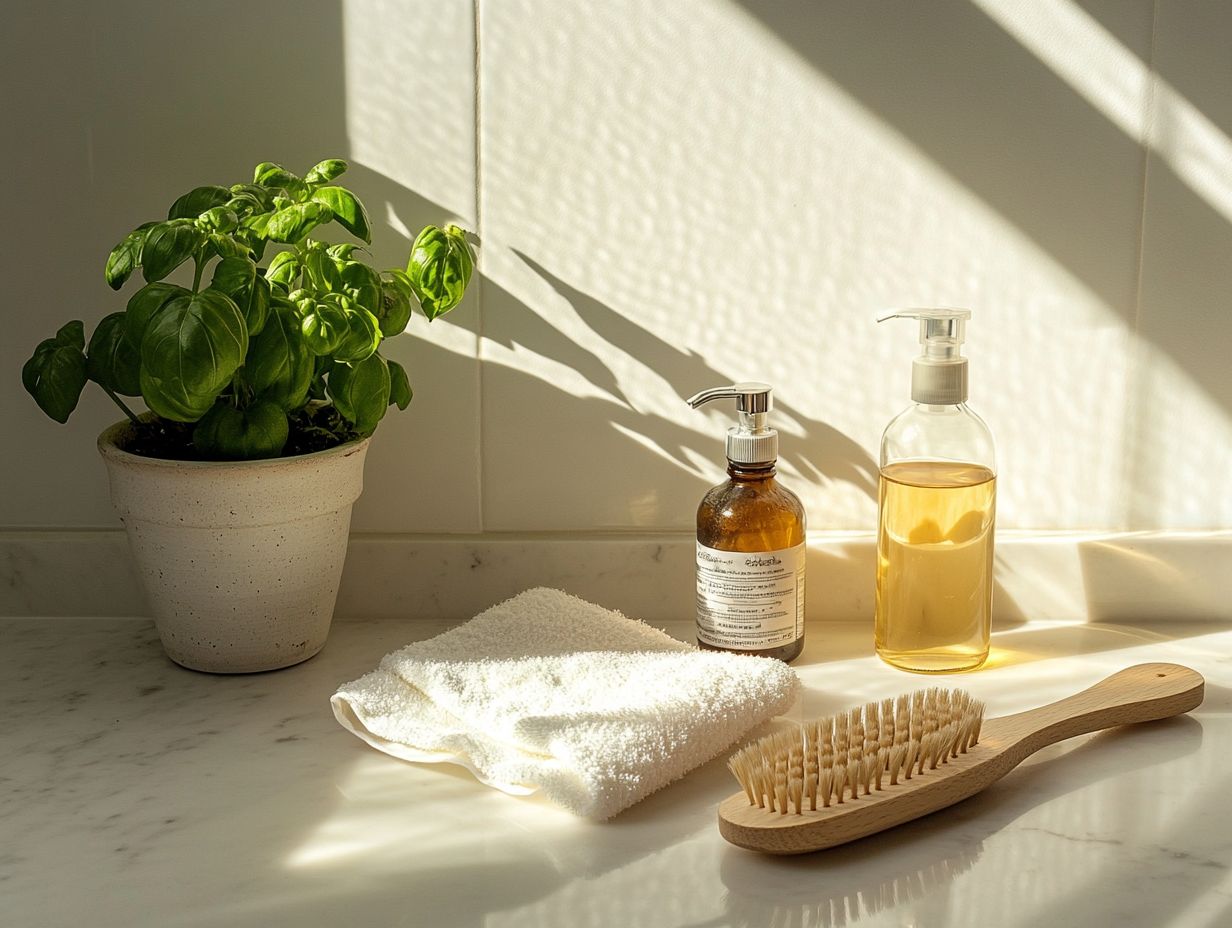
Ready to transform your cleaning routine? Making your own cleaning products is fun and eco-friendly!
Creating your own cleaning products is not just a smart move; it s a gratifying way to take charge of what goes into your home. This practice minimizes household waste and avoids harmful chemicals found in conventional cleaners.
By opting for common natural alternatives like vinegar, baking soda, and essential oils, you can whip up effective DIY cleaning solutions that tackle a range of tasks. This significantly reduces packaging waste while supporting the green cleaning and zero waste movements.
Crafting your own cleaning supplies leads to considerable savings since the ingredients are often more affordable than their commercial counterparts. You can ensure ingredient safety and effectiveness while customizing formulas to suit your specific cleaning needs.
With homemade solutions, you also get to experiment with different scents and the therapeutic benefits of essential oils. This transforms routine cleaning into a more enjoyable experience.
In essence, this approach gives you the power to make informed choices while fostering a deeper connection to responsible living, echoing the principles of the green household cleaning market.
2. Look for Eco-Friendly Labels
When you re shopping for cleaning products, it s essential to seek out eco-friendly labels and certifications. These signal a product s dedication to ingredient safety and environmental sustainability.
Look for endorsements from organizations like the American Cleaning Institute or the Environmental Working Group. Recognized certifications like the Safer Choice symbol and EcoCert label guide you toward reliable options that do not contain phthalates, benzene, or other harmful chemicals.
By prioritizing certified products, you can confidently diminish your environmental impact. Understanding these labels gives you insight into how certain products are formulated, often showcasing the absence of harmful chemicals.
Brands such as Seventh Generation and Mrs. Meyer’s Clean Day proudly flaunt these certifications, highlighting their commitment to eco-responsibility. By selecting products from these companies, you support sustainable practices and make informed decisions about your health and safety.
This approach gives you the power to advocate for better environmental practices in your daily life while encouraging manufacturers to innovate and develop greener alternatives.
Ultimately, you contribute to fostering a more sustainable future for everyone.
3. Use Natural Alternatives
Incorporating natural alternatives into your cleaning routine is an important step toward embracing green cleaning practices that enhance both your health and the environment.
By opting for natural ingredients like lemon juice, baking soda, and essential oils, you can effectively substitute many conventional cleaning products. This achieves powerful cleaning results without the health risks often associated with conventional cleaners.
Choosing biodegradable materials and natural alternatives allows you to contribute to a more sustainable cleaning approach.
These substitutes deliver impressive cleaning power and significantly reduce your exposure to harsh chemicals. For example, white vinegar serves as an excellent disinfectant that effortlessly cuts through grease.
Using natural alternatives fosters a healthier home environment by minimizing indoor air pollution. This is especially important in households with children or pets.
By embracing these natural cleaning methods, you can make a notable impact on your wellbeing and the planet itself.
What Are Some Eco-Friendly Cleaning Tips?
Implementing eco-friendly cleaning tips can significantly elevate your sustainable cleaning routine. Not only does this enhance its effectiveness, but it also diminishes your environmental impact, as highlighted by Better Homes & Gardens.
By incorporating reusable cloths, concentrated eco-friendly products, and natural alternatives, you’ll be amazed at how much waste you can minimize and how you can reduce your dependence on traditional cleaners. This contributes to a more sustainable future.
These strategies promote zero waste cleaning practices and foster a healthier lifestyle by limiting your exposure to harmful chemicals that can affect your health. To enhance your cleaning efforts, learn how to create a safe cleaning routine. Embrace this greener approach, and you’ll find that a clean home doesn’t have to come at the expense of the planet, promoting ecological responsibility.
1. Use Reusable Cleaning Supplies
Using reusable cleaning supplies is a straightforward yet powerful way to reduce waste while keeping your cleaning routine eco-friendly. By choosing reusable cloths over disposable paper towels and cleaning wipes, you can significantly shrink your environmental footprint and minimize packaging waste, supporting a sustainable cleaning routine.
This shift not only promotes sustainability but also translates into cost savings over time. Imagine using products crafted from sustainable materials they amplify your positive impact on the planet.
For instance, reusable microfiber cloths are exceptional at capturing dust and dirt. Since they’re washable, they offer a durable solution for your everyday cleaning tasks, endorsed by experts like Samara Geller from the Environmental Working Group.
Switching to refillable cleaning bottles is another smart move that helps lower plastic consumption, a change supported by the American Cleaning Institute and sustainability advocates like Celia Ristow. After all, those frequent purchases of single-use products can quickly lead to an alarming amount of plastic waste.
To ensure your reusable supplies last, remember to wash them regularly according to the manufacturer’s guidelines. Also, steer clear of fabric softeners, which can diminish their cleaning capabilities. By doing this, you re not just adopting a greener cleaning solution; you re also embracing a more economical approach to keeping your home spotless.
2. Choose Concentrated Products
Choosing concentrated eco-friendly cleaning products is a savvy move that enhances your cleaning power while significantly reducing waste and packaging. These concentrated formulas allow you to use smaller amounts of product to achieve impressive results, making them both cost-effective and environmentally friendly for households eager to lessen their ecological footprint.
By opting for concentrated products, you not only save money but also contribute to a more sustainable cleaning routine. The concentrated nature of these products greatly diminishes the volume of waste generated since they require less packaging compared to traditional cleaners.
Brands like Method and Seventh Generation offer concentrated versions of their popular all-purpose and laundry cleaners, making it easy for you and your family to adopt greener habits without sacrificing performance. Another fantastic option is the eco-friendly cleaning tabs from Blueland, which dissolve in water, effectively eliminating excess plastic waste entirely.
By making the switch to concentrated formulas, you enhance your cleaning efficiency while playing a vital role in protecting the environment.
Start implementing these eco-friendly cleaning tips today to make a positive impact on our planet!
3. Opt for Microfiber Cloths
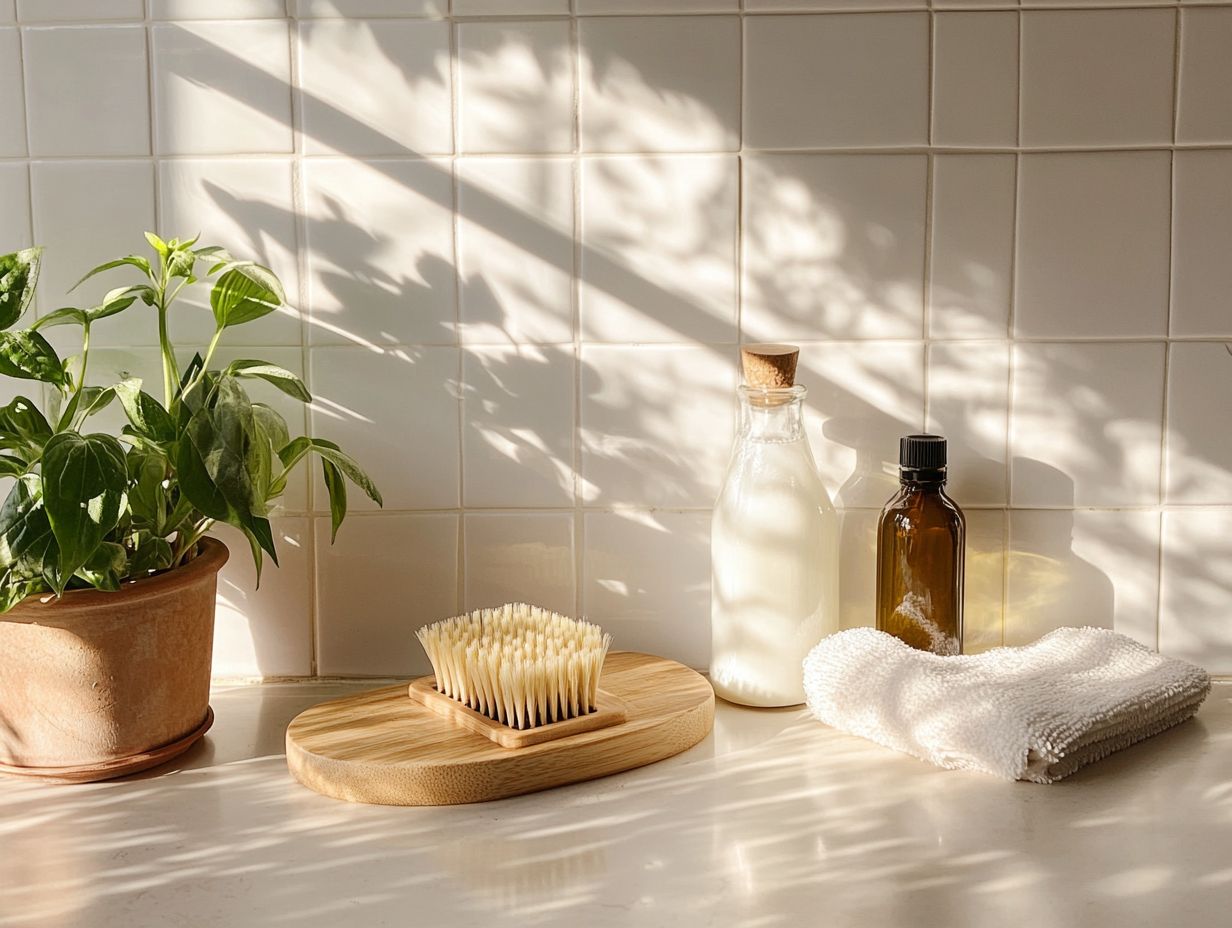
Incorporating microfiber cloths into your cleaning routine is a smart choice for the environment. These cloths not only elevate your cleaning efficiency but also minimize waste. They excel at capturing dirt, dust, and allergens without the need for chemical cleaners, offering you a sustainable alternative to conventional cleaning supplies.
Their durability and reusability further enhance a zero-waste approach, benefiting both your home and the planet.
These cloths trap and eliminate particles effectively, contributing to improved indoor air quality and fostering a healthier environment for you. They also require less water during use, making them a resource-efficient choice for your cleaning tasks.
To ensure you get the most out of your microfiber cloths, avoid fabric softeners and bleach during washing. These can compromise the fibers and diminish their effectiveness. Instead, choose a gentle detergent and wash them in warm water to guarantee they remain functional and reliable for many cleanings to come.
4. Use Vinegar and Baking Soda for Tough Cleaning Jobs
Utilizing natural alternatives like vinegar and baking soda for tough cleaning jobs is an exceptional eco-friendly solution. These ingredients effectively tackle grime and stains without harsh chemicals.
Both vinegar and baking soda possess unique properties that make them powerful cleaning agents. Vinegar acts as a substance that kills germs and deodorizer, while baking soda serves as a gentle abrasive and deodorizer. This dynamic duo enhances your cleaning routine and promotes a healthier home environment.
For instance, when faced with a stubborn clogged drain, you can easily use a mixture of vinegar and baking soda. Pour half a cup of baking soda followed by half a cup of vinegar down the drain, let it fizz, and then rinse with hot water for a thorough clean.
If you re dealing with pesky stains on your countertops, a paste made from baking soda and a dash of water can work wonders. Apply it, scrub gently, and rinse clean for impressive results.
Beyond their remarkable cleaning abilities, these natural alternatives shine bright as budget-friendly and safe options! They are cost-effective and non-toxic, making them safe choices for households with children and pets.
By embracing these eco-friendly practices, you not only reduce chemical exposure but also contribute to a more sustainable lifestyle. Join the movement towards a cleaner planet today!
Watch this video to learn more about effective eco-friendly cleaning methods!
Frequently Asked Questions
Why is it important to create an eco-friendly cleaning routine?
Creating an eco-friendly cleaning routine helps reduce harmful chemicals in the environment and promotes a healthier living space for you and your family.
What are some eco-friendly alternatives to traditional cleaning products?
Some eco-friendly alternatives include:
- Using natural ingredients like vinegar and baking soda
- Choosing plant-based cleaning products
- Making your own DIY cleaners with essential oils
How can I reduce waste in my cleaning routine?
You can reduce waste by:
- Using reusable cleaning cloths instead of disposable ones
- Buying products in bulk to reduce packaging
- Properly disposing of any hazardous materials
Can I still effectively clean my home with eco-friendly products?
Yes, eco-friendly products can be just as effective as traditional cleaners. Look for ones that are certified by third-party organizations like Green Seal or EcoLogo for reassurance.
What are some other benefits of using eco-friendly cleaning products?
In addition to being better for the environment, eco-friendly cleaning products:
- Are safer for your health
- Have a lower carbon footprint
- Can save you money in the long run
How can I make my own eco-friendly cleaning products at home?
You can make your own cleaners using simple ingredients like vinegar, baking soda, and essential oils. There are many online resources and recipes available for creating your own eco-friendly cleaning products.

